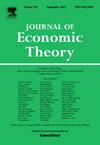Universal social welfare orderings and risk
IF 1.2
3区 经济学
Q3 ECONOMICS
引用次数: 0
Abstract
How can social prospects be evaluated and compared when there may be a risk on i) the actual allocations that people will receive, ii) the existence of these future people, and iii) their preferences? This paper investigates this question, which can arise when considering policies, such as climate policy, that affect people who do not yet exist. We start from the observation that there is no social ordering that meets minimal requirements of fairness, social rationality, and respect for people's ex ante preferences. We explore three ways around this impossibility. First, if we drop the ex ante Pareto requirement, we can obtain fair ex post criteria that take an (arbitrary) expected utility of an equally-distributed equivalent level of well-being. Second, if the social ordering is not an expected utility, we can obtain fair ex ante criteria that evaluate uncertain individual prospects with a certainty-equivalent measure of well-being. Third, if we accept that interpersonal comparisons rely on VNM utility functions even in absence of risk, we can construct expected utility social orderings that satisfy a version of Pareto ex ante.
普遍的社会福利秩序和风险
当存在以下风险时,如何评估和比较社会前景:(1)人们将获得的实际分配,(2)这些未来人的存在,(3)他们的偏好?本文调查了这个问题,在考虑政策时可能会出现这个问题,比如气候政策,影响到那些还不存在的人。我们的出发点是观察到,没有一种社会秩序能够满足公平、社会理性和尊重人们事前偏好的最低要求。我们探索了三种解决这种不可能性的方法。首先,如果我们放弃事前帕累托要求,我们可以获得公平的事后标准,该标准采用平均分配的等效福利水平的(任意)预期效用。其次,如果社会秩序不是一种预期效用,我们可以获得公平的事前标准,用确定性等效的福祉衡量来评估不确定的个人前景。第三,如果我们承认即使在没有风险的情况下,人际比较也依赖于VNM效用函数,我们就可以构建满足事前帕累托理论的期望效用社会排序。
本文章由计算机程序翻译,如有差异,请以英文原文为准。
求助全文
约1分钟内获得全文
求助全文
来源期刊

Journal of Economic Theory
ECONOMICS-
CiteScore
2.50
自引率
12.50%
发文量
135
期刊介绍:
The Journal of Economic Theory publishes original research on economic theory and emphasizes the theoretical analysis of economic models, including the study of related mathematical techniques. JET is the leading journal in economic theory. It is also one of nine core journals in all of economics. Among these journals, the Journal of Economic Theory ranks fourth in impact-adjusted citations.
 求助内容:
求助内容: 应助结果提醒方式:
应助结果提醒方式:


